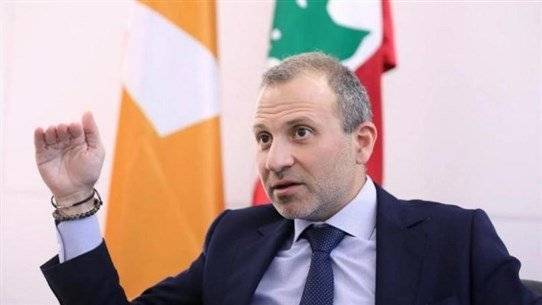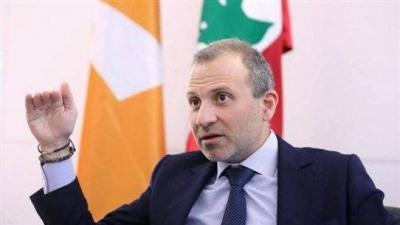As the term of President Michel Aoun nears its end, the assessment focuses on what the National Current has accomplished. This party, which could have reaped the benefits of six years in the presidency, is preparing to face the toughest exam in its current leadership's history. Six years ago, the National Free Current was poised to enter the Baabda Palace with President Michel Aoun, on a white horse, with the Mar Mikhael Agreement, a government settlement with Prime Minister Saad Hariri, and the blessing of Hezbollah. At that time, the Current continued what Aoun himself initiated upon his return to Beirut from Paris in 2005, forcefully entering administrations, governments, and Parliament. Bassil, under Aoun’s cover, successfully set successive conditions and imposed his affiliates in administrations, as well as in official, security, military positions, and parliamentary and governmental seats. He ended up having spheres of influence in every ministry he gained, and the same applied abroad due to his presence in the Foreign Ministry. Above all, Bassil and the Current inherited political bases that were either chaotic or lost their political cover after the change in eras, along with administrative, political, religious, and ecclesiastical figures, within their political loyalty over the years, in addition to tightening control over the Current internally so that he now has the first and last say.
Today, the Current realizes that the final months of Aoun's term are the most challenging political experiences it has faced, which it previously managed to overcome on its way to the Baabda Palace. As the hope for Bassil's ascent to the presidential palace fades, the current situation places Bassil alone, apart from Aoun, who crowned his political journey, with all its disappointments and successes, by returning once again to the Baabda Palace. The election of Bassil as president is almost miraculous, not only due to American sanctions, the French stance towards him, or Arab encirclement, but also because of internal calculations and the positions of Islamic and Christian parties towards him. Understanding this, and realizing that his ally Hezbollah cannot propel him to power as it did with Aoun, there was hope that he would shift in the final months to being a primary voter rather than a primary candidate. However, what is transpiring so far is quite the opposite. He is engaging in purely internal maneuvers to secure continuity that ends with the conclusion of Aoun’s term, particularly in how he manages the government formation file, using the same methods as before. The conditions of the game today are entirely different from what they were before and during the term. There were even speculations that he would maneuver significantly to ensure the new government at any cost, so it would not be a caretaker government inheriting Aoun, regardless of imagined scenarios about the possibility of his remaining in Baabda. However, the opposite occurred after he prioritized his current role at the expense of the upcoming demands.
Bassil understands that he has become isolated internally, without allies, and that his “miraculous” victory in the parliamentary elections is not built on a solid foundation. The figures he garnered with his allies' support cannot be relied upon to establish his position at the beginning of a new term, even if the next president is Hezbollah's closest ally. Despite this, he continues to leap over all considerations that no longer bear significance in the last weeks of the term. In a manner similar to the saying "If it had lasted for others, it would not have reached you," Bassil is well aware that what he inherited over years from non-Aounian bases will certainly not maintain their loyalty to him, no matter who the next president of the republic is. Everything Hezbollah guarantees him in terms of deals, political ceilings, and presence, even through appointments and quotas, ends at the door of the presidential palace. This is neither the first nor the last experience in the course of political life, as seen with the bases of the Kataeb Party, the Lebanese Forces, Michel Mur, and local leaders whose political orientations changed with the swearing-in of the new president. This means that what he has sown over the past years may not continue to be harvested in the coming years, as the changing political eras inevitably make grassroots support volatile and lacking any final allegiance. Additionally, the structure of security personnel, judges, bankers, and all who orbit the political class makes it easy to shift allegiances from one side to another overnight.
However, the toughest exam lies within the Current itself. The internal battles of the Current in the parliamentary elections reflected one of the manifestations of the conflicts that became exposed to the public without any deterrent, even with Aoun’s umbrella. However, the Current's scene will inevitably change, because the Aounism that thrived since the 1990s is altogether different from Bassilism. There are Aounian MPs and leaders awaiting the right moment on October 31 for goals unrelated to those of others, and there are also internal and familial reckonings and many pitfalls to navigate after the fall of the presidential umbrella.
Alongside all of this, which Bassil is aware of and based on which he continues his obstinacy regarding the proposed settlements, the Current still performs at the same tempo. The confidence that Hezbollah will remain regardless of changing equations is intact, and the Current will continue after Aoun leaves Baabda with a Christian bloc, even if it is diminished along the way. However, the challenge lies in what the Current will become after October 31 and the extent to which its leadership can pass the end-of-term exam.




